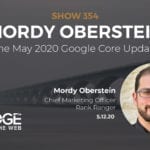 When Site Strategics CEO Erin Sparks and Digital Media Director Tom Brodbeck spoke with special guest Brad Geddes, PPC expert and co-founder of Adalysis, during Episode 306 of the award-winning EDGE of the Web podcast, Brad explained his own career path in digital marketing and then honed in on how machine learning is transforming PPC.
When Site Strategics CEO Erin Sparks and Digital Media Director Tom Brodbeck spoke with special guest Brad Geddes, PPC expert and co-founder of Adalysis, during Episode 306 of the award-winning EDGE of the Web podcast, Brad explained his own career path in digital marketing and then honed in on how machine learning is transforming PPC.
Brad Geddes: His Background and Experience
Brad has been involved in online advertising since 1998, which means he’s literally seen it all. Over the years, he has provided a variety of consulting services including usability, conversion optimization, product positioning, and agency consulting. Brad is one of only two Google-approved AdWords seminar leaders, and has conducted more than 100 officially-supported AdWords seminars and has spoken at more than 125 conventions and conferences around the world. It was back in 2006 when Google was trying to educate users because PPC can be complex. Google liked Brad’s approach to training and granted him a perpetual license to do so.
Brad was engaged in web design in the very beginning of the world wide web back in 1995, as a hobby. Then in 1998 he discovered affiliate marketing and became interested in SEO techniques. He created an account with GoTo.com, the company that pioneered PPC search advertising. Soon companies were asking him to help their efforts, leading him to create his first digital marketing agency in 2001. There was a clear need for software so he immersed himself in building software, which he then sold to a client. In Chicago he joined LocalLaunch and helped build it into the first very successful local data submission company with 110,000 SEO clients and 42,000 paid search accounts. The company was then purchased by RR Donnelley. In 2012 Brad wanted to get back into software and founded Adalysis, a software platform that automates the number-crunching pieces of the digital marketing puzzle to free up humans to do the parts they’re good at – contextual decision-making, ad creativity, strategy and problem-solving.
What Machine Learning Can and Can’t do for Digital Marketing
What computers are good at is pattern recognition, anomaly detention, outlier analysis, and making decisions off of repeatable, predictable data. Those are two important words: repeatable, predictable data. What computers struggle with is understanding the why or the context of repeatable, predictable data. Is it because that’s the way the world works, or is it just coincidental?
For example, let’s say every time lightning strikes the ground, beef consumption increases. These things are correlated, but one does not cause the other. The computer doesn’t know that. The computer would see this pattern and recommend that McDonalds buy more ads when lightning storms are predicted because people are going to eat more beef. A human looking at this data would realize these things are not related and wouldn’t make that recommendation. So, while the computers can point out the correlations, the humans are the ones who have to look at them and decide whether or not it makes sense to act on the data. If humans let the computers do it all automatically, then some of the actions taken are just not going to be successful because it lacks the context to make the best decision.
Machine Learning Needs LOTS of the Right Data to be Effective
Here’s another example of how computers and humans differ because of lived human experience and what kind of data computers can use to learn. Take a classic 1980s video game like Pitfall. Humans can easily complete a single level of the game in a few minutes. But when MIT set up dozens of computer algorithms to play the game, only one algorithm completed the level, and it took 40 years of game-play to do it. Why? Humans have all this lived experience and prior knowledge to know it’s a fire, I should jump, or it’s a ladder, I should climb down. The algorithm doesn’t have that prior contextual knowledge. But if you then set it up so that the algorithm gets immediate feedback to say an action it took was right or wrong, the computers immediately beat the humans at the game. The computers just needed the right data feed to learn what to do.
The takeaway here is that computers need lots of data to learn. If the computer has sparse data, it won’t perform well. This is where people get into trouble with automation – letting computers do too much of the work with too little data. And they’re just not good at some tasks, like identifying intent. The computer will think a repeated, predictable pattern signifies intent, but humans know that’s not always the case. Intent is tied up in human emotions, which is why given the same data, the computers and the humans will decide to take different actions, or not act at all. Computers are always logical, but humans are not always logical. Computers are trying to guess how in an illogical creature would do something when computers are not programmed to be illogical, so it just doesn’t work.
At Adalysis, we’re all about automating what makes sense to automate in order to let the computers handle what they’re good at, thus freeing up the humans to handle the pieces of the puzzle that they’re good at, which is the best part of the work.
Connect with Brad Geddes
Twitter: @bgtheory (https://twitter.com/bgtheory)
LinkedIn: https://www.linkedin.com/in/ewhisper
Adalysis website: https://adalysis.com
Website: https://bgtheory.com
Amazon author page: https://www.amazon.com/Brad-Geddes/e/B0037A2UNK
Discover Your Digital Marketing ROI with Site Strategics
Stop wondering about your digital marketing ROI and find out how you’re really doing. EDGE sponsor Site Strategics can put together a Digital Marketing ROI Report that examines your existing SEO, content, social media, and PPC. Visit https://edgeofthewebradio.com/roi/ to get 30% off a comprehensive review of your digital assets!


